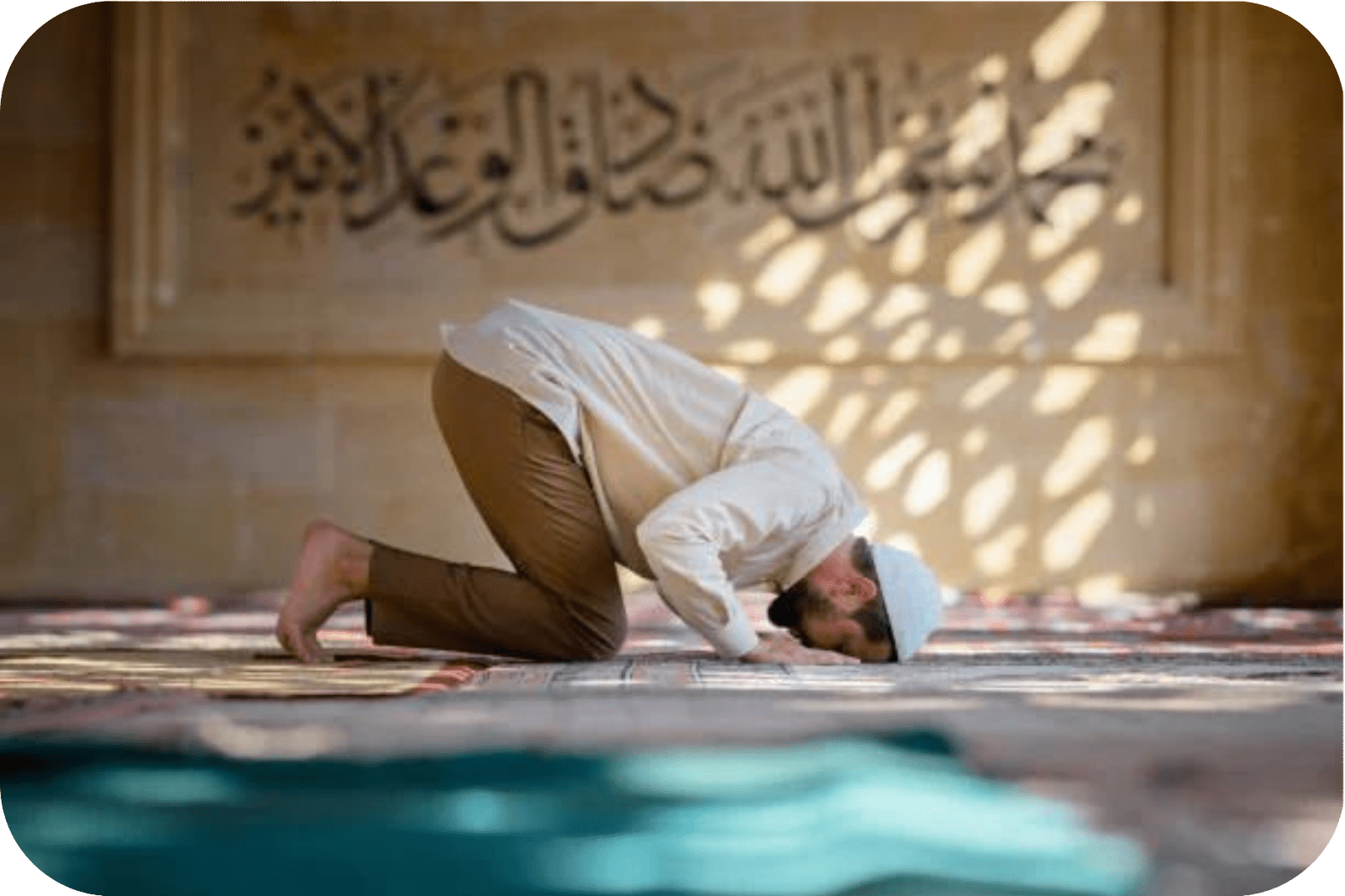5 Ways The Prophet Was Romantic To His Wife
5 Ways The Prophet Was Romantic To His Wife

As the Western calendar approaches Valentine’s Day, a day cherished for celebrating romantic love and affection, we navigate a different path exploring the profound aspects of love within Islamic teachings. And what better exemplar than the best husband ever, Prophet Muhammad (PBUH)?
In this article, we delve into the gentle and beautiful ways the Prophet (PBUH) expressed love, care, and devotion towards his wives, offering timeless insights into fostering enduring, affectionate relationships.
Inspired by the Prophet's enduring love and respect toward his wives, consider honouring your beloved wife with a meaningful gift.
Explore our collection of thoughtful gifts and essentials, echoing the Prophet's encouragement to exchange gifts as a means to foster love and connection.
The foundation of love in Islam
In Islamic, the concept of love extends far beyond mere romantic feelings. It extends to encompass a wider scope, embracing values like compassion, kindness, and empathy. Prophet Muhammad (PBUH), revered as the ultimate example for mankind, consistently demonstrated these virtues in his interactions with his spouses.
Throughout his life, Prophet Muhammad (PBUH) emphasised the significance of respect and understanding within marital relationships. His teachings advocated for mutual respect, patience, and compassion as foundational pillars of a harmonious and loving partnership. This foundation laid the groundwork for nurturing strong and enduring bonds between spouses, establishing a standard of love and respect that echoes through Islamic principles.
5 ways the Prophet (PBUH) expressed his love to his wives
In understanding the profound values of love within Islam, let's delve deeper into how Prophet Muhammad (PBUH) showcased deep love and care for his wives. His actions not only reflected profound love and compassion but also established an outstanding standard for marital relationships:
1. Words of affirmation
Prophet Muhammad (PBUH) had a unique way of expressing love through words to his wives. For instance, Ayesha (RA), his beloved wife, would often ask how much he loved her. He lovingly compared his love to a rope's knot, signifying its strength and steadfastness.
Additionally, the Prophet (PBUH) taught the importance of speaking kind and truthful words, mentioning that a good word is an act of charity, stating:
“It is also charity to utter a good word.”
(Sahih al-Bukhari and Muslim)
2. Gifts
Even after the passing of Khadijah (RA), Prophet Muhammad (PBUH) continued to honour her memory by sending portions of slaughtered sheep to her friends.
This act showcased his enduring love and respect for her. The Prophet (PBUH) encouraged the exchange of gifts as a way to foster love and connection among people.
“Give gifts and you will love one another.”
(Sahih al-Bukhari)
3. Acts of service
Engaging actively in household chores, such as mending clothes and performing daily tasks, demonstrated the Prophet's (PBUH) humility and dedication to serving his family.
He willingly participated in domestic responsibilities, exemplifying his readiness to assist and support his family members, setting an exemplary standard of care and consideration within the household, Al-Aswad reported that he asked Ayesha (RA):
“What did the Prophet (PBUH) do at home?” She said: “He used to be at the service of his family, and when it was time for prayer, he would go out to pray”
(Sahih al-Bukhari)
Ayesha (RA) is also reported to have said in another narration:
“He acted like other men. He would mend his clothes, milk his goat, and serve himself.”
(Sahih al-Bukhari)
4. Physical touch
Prophet Muhammad (PBUH) conveyed affection through physical gestures, illustrating the importance of touch in reinforcing love and connection.
His practice of greeting his wife with a kiss upon returning home symbolised warmth and fondness, and often, the Prophet (PBUH) laid his head on the lap of Aisha (RA) reciting Quran, while she was on her menses.
Additionally, in moments of public distress, the Prophet (PBUH) offered comfort to his wives by wiping away tears and displaying consoling gestures, demonstrating his compassion and tenderness.
5. Quality time
Prophet Muhammad (PBUH) dedicated quality time to his wives, highlighting the significance of undivided attention.
He engaged in activities like friendly races and walks, creating cherished memories and emphasising the value of spending meaningful time together. Moreover, a profound Hadith states:
“When a husband and wife look at each other with love, Allah looks at both of them with mercy.”
(Sahih al-Bukhari)
This Hadith underscores the divine significance of love and compassion between spouses.
5 relationship lessons from the Prophet Muhammad (PBUH)
Prophet Muhammad (PBUH) was a loving and caring husband and did not hesitate to carry out little acts of kindness that showed his affection toward his wives.
He is the perfect example for us to follow as he exemplified the perfect character of a spouse who follows the guidance of Allah (SWT). He is reported to have said:
“The best of you is the best to his wife and I am the best to my wife.”
(At-Tirmidhi and Ibn Majah)
1. Transparency and integrity
Transparency and honesty are crucial in relationships. Just as the Prophet Muhammad (PHUB) and Khadijah's (RA) characters were transparent and their circumstances known, strive for open communication in your relationship.
Share your thoughts, feelings, and aspirations openly, fostering an environment of trust and sincerity.
2. Mutual support and vulnerability
Learn to be vulnerable and supportive in challenging times. The Prophet Muhammad (PHUB) sought solace and support from Khadijah (RA), indicating the importance of being there for each other during difficult moments.
Encourage an environment where both partners feel safe expressing their emotions and seeking comfort and support.
3. Shared responsibility and service
Adopt a spirit of shared responsibility. As the Prophet Muhammad (PHUB) engaged in household chores and tasks, understand that sharing responsibilities fosters a sense of partnership and unity.
Consciously contribute to domestic duties, recognizing that a collaborative approach nurtures a harmonious home.
4. Observance and intentionality
Pay attention to small details and be intentional in your actions. The Prophet Muhammad (PHUB)'s observance, like eating or drinking from the same place as his wife, showcases the significance of being observant and initiating loving gestures.
Be mindful of your partner's preferences and make intentional efforts to strengthen your connection.
5. Expressing Affection and Love
Embrace various forms of affection and playfulness. The Prophet Muhammad (PHUB) demonstrated different ways of showing affection and playfulness with Aisha (RA), illustrating the importance of expressing love and care.
Incorporate gestures of affection, humour, and play into your relationship, nurturing a loving and joyous bond.
Conclusion
In the context of participating in non-Muslim celebrations, Islam views certain practices associated with these festivities as conflicting with Islamic teachings. Engaging in religious aspects of non-Muslim celebrations, including Valentine's Day, is considered impermissible (haram) in Islam. The act of imitating or directly participating in rituals or customs that contradict Islamic beliefs is discouraged and deemed contrary to Islamic principles.
Buying at Riwaya
Delve into our collection of books and resources detailing the life of the Prophet Muhammad and his expressions of love and affection towards his wives.
Explore our collection for thoughtful gifts and essentials that honour the beauty and depth of Islamic traditions — perfect choices to gift your loved ones and celebrate the essence of love in Islam.
Selling at Riwaya
Join us in fostering a community that appreciates and promotes the richness of Islamic culture and traditions.
We invite sellers offering products aligned with Islamic values to showcase their items on our platform, embodying the essence of love within Islamic teachings. Our marketplace provides a space for sellers to showcase items that embody Islamic values and cater to the beauty of Islamic traditions and values.
Join us in fostering a community that appreciates and promotes the richness of Islamic culture and traditions.
FAQs
Q1: How Many Wives Did the Prophet Muhammad Have?
The Prophet Muhammad (peace be upon him) had a total of eleven wives throughout his life, each marriage serving different purposes, such as fostering alliances, supporting widows, and setting an example of compassion and care for women.
Q2: What Were the Names of the Prophet Muhammad's Wives?
The names of the Prophet Muhammad (peace be upon him)'s wives were Khadijah bint Khuwaylid (RA), Sawda bint Zam'a (RA), Aisha bint Abi Bakr (RA), Hafsa bint Umar (RA), Zaynab bint Khuzayma (RA), Umm Salama (RA), Zaynab bint Jahsh (RA), Juwayriya bint al-Harith (RA), Umm Habiba (RA), Safiyya bint Huyayy (RA), and Maymunah bint al-Harith (RA).
Q3: Did the Prophet Muhammad Treat All His Wives Equally?
Yes, the Prophet Muhammad (peace be upon him) sought to treat his wives with fairness, justice, and kindness to the best of his ability. He endeavoured to provide equal financial support and companionship among his wives, reflecting his commitment to equitable treatment.
Q4: What Qualities Did the Prophet Muhammad Display in His Marital Relationships?
The Prophet Muhammad (peace be upon him) displayed qualities of love, compassion, respect, and fairness in his marital relationships. He offered emotional support, participated in household chores, ensured equitable treatment, and emphasised the importance of love and empathy in nurturing strong family bonds.
Q5: What Can We Learn From the Prophet Muhammad's Marriages?
The Prophet Muhammad (peace be upon him)'s marriages serve as a model for compassion, respect, and kindness in relationships. His conduct encourages empathy, understanding, and support within marriages, fostering an environment of love, harmony, and mutual respect. Learning from his example can guide individuals in building healthy and loving relationships based on Islamic values of compassion and understanding.



